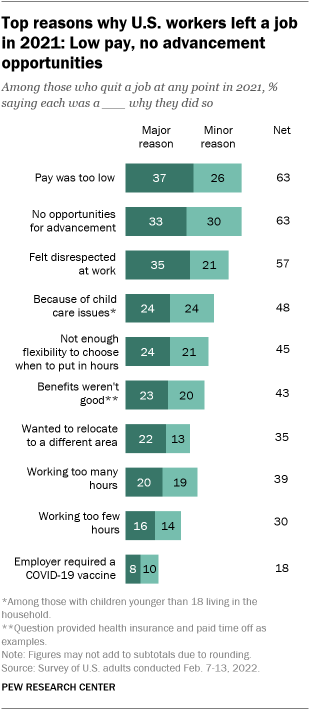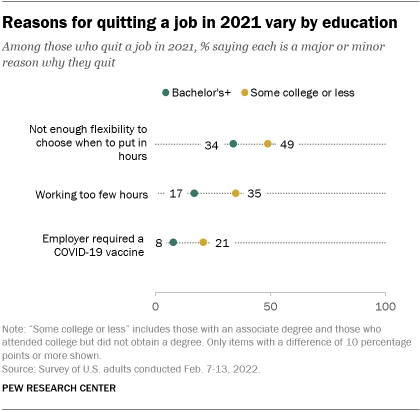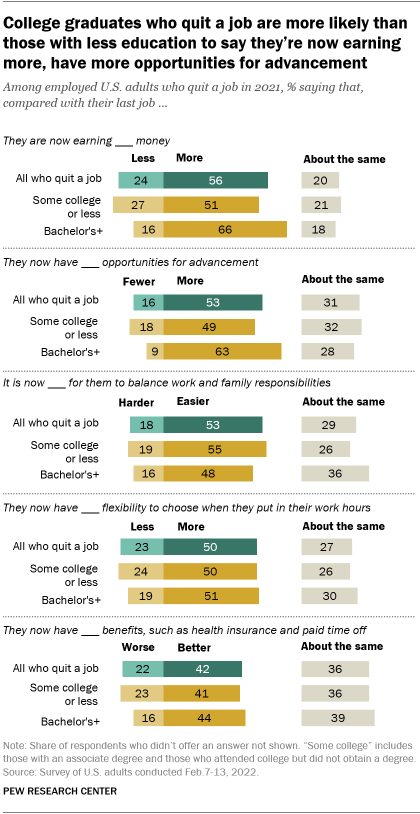You Might Not Be Able to Afford It But Then Again Neither Can the People Who Already Live There

The COVID-19 pandemic ready off nearly unprecedented churn in the U.S. labor market place. Widespread job losses in the early months of the pandemic gave manner to tight labor markets in 2021, driven in role by what'southward come to be known as the Cracking Resignation. The nation's "quit rate" reached a 20-year high last Nov.

A new Pew Research Center survey finds that low pay, a lack of opportunities for advocacy and feeling disrespected at work are the top reasons why Americans quit their jobs terminal twelvemonth. The survey also finds that those who quit and are at present employed elsewhere are more likely than not to say their current job has ameliorate pay, more opportunities for advancement and more than work-life balance and flexibility.
Majorities of workers who quit a task in 2021 say low pay (63%), no opportunities for advocacy (63%) and feeling disrespected at work (57%) were reasons why they quit, co-ordinate to the Feb. 7-13 survey. At least a third say each of these were major reasons why they left.
Roughly half say child care issues were a reason they quit a job (48% amidst those with a kid younger than 18 in the household). A similar share point to a lack of flexibility to choose when they put in their hours (45%) or non having good benefits such as health insurance and paid time off (43%). Roughly a quarter say each of these was a major reason.
Pew Research Middle conducted this analysis to better understand the experiences of Americans who quit a job in 2021. This analysis is based on 6,627 non-retired U.South. adults, including 965 who say they left a job by choice last year. The data was collected as a function of a larger survey conducted February. vii-thirteen, 2022. Everyone who took part is a member of the Center's American Trends Panel (ATP), an online survey console that is recruited through national, random sampling of residential addresses. This style, almost all U.S. adults have a chance of selection. The survey is weighted to be representative of the U.South. adult population by gender, race, ethnicity, partisan affiliation, education and other categories. Read more than about the ATP's methodology.
Here are the questions used for this analysis, along with responses, and its methodology.
About four-in-x adults who quit a job last year (39%) say a reason was that they were working too many hours, while three-in-ten cite working too few hours. Well-nigh a third (35%) cite wanting to relocate to a unlike surface area, while relatively few (18%) cite their employer requiring a COVID-19 vaccine every bit a reason.
When asked separately whether their reasons for quitting a job were related to the coronavirus outbreak, 31% say they were. Those without a four-yr college caste (34%) are more than likely than those with a bachelor's degree or more than instruction (21%) to say the pandemic played a role in their decision.
For the nearly part, men and women offer like reasons for having quit a job in the by yr. But there are pregnant differences past educational attainment.

Among adults who quit a job in 2021, those without a iv-year college degree are more probable than those with at to the lowest degree a bachelor's caste to bespeak to several reasons. These include not having plenty flexibility to decide when they put in their hours (49% of non-college graduates vs. 34% of college graduates), having to work besides few hours (35% vs. 17%) and their employer requiring a COVID-19 vaccine (21% vs. 8%).
In that location are also notable differences by race and ethnicity. Non-White adults who quit a job last year are more probable than their White counterparts to say the reasons include not having enough flexibility (52% vs. 38%), wanting to relocate to a different surface area (41% vs. xxx%), working too few hours (37% vs. 24%) or their employer requiring that they have a COVID-xix vaccine (27% vs. x%). The non-White category includes those who identify as Black, Asian, Hispanic, another race or multiple races. These groups could non be analyzed separately due to sample size limitations.
Many of those who switched jobs see improvements
A bulk of those who quit a job in 2021 and are non retired say they are now employed, either full-time (55%) or part-fourth dimension (23%). Of those, 61% say it was at least somewhat easy for them to find their electric current job, with 33% saying it was very piece of cake. One-in-five say it was very or somewhat difficult, and 19% say information technology was neither easy nor difficult.
For the most part, workers who quit a job last twelvemonth and are at present employed somewhere else see their current work state of affairs every bit an comeback over their nearly recent chore. At least one-half of these workers say that compared with their last job, they are now earning more money (56%), accept more opportunities for advancement (53%), accept an easier time balancing piece of work and family responsibilities (53%) and accept more flexibility to choose when they put in their work hours (50%).
Even so, sizable shares say things are either worse or unchanged in these areas compared with their concluding job. Fewer than half of workers who quit a chore last year (42%) say they now take better benefits, such as health insurance and paid fourth dimension off, while a similar share (36%) says it'due south nigh the same. Near one-in-five (22%) now say their current benefits are worse than at their last job.

College graduates are more likely than those with less didactics to say that compared with their last task, they are now earning more (66% vs. 51%) and have more opportunities for advancement (63% vs. 49%). In turn, those with less education are more likely than college graduates to say they are earning less in their electric current chore (27% vs. 16%) and that they have fewer opportunities for advancement (18% vs. 9%).
Employed men and women who quit a job in 2021 offer similar assessments of how their current task compares with their last 1. Ane notable exception is when it comes to balancing work and family responsibilities: Six-in-ten men say their electric current chore makes it easier for them to balance work and family – higher than the share of women who say the same (48%).
Some 53% of employed adults who quit a job in 2021 say they accept inverse their field of work or occupation at some betoken in the past year. Workers younger than age 30 and those without a postgraduate degree are peculiarly likely to say they have made this blazon of modify.
Younger adults and those with lower incomes were more likely to quit a job in 2021

Overall, about one-in-five non-retired U.Southward. adults (xix%) – including similar shares of men (18%) and women (20%) – say they quit a job at some point in 2021, pregnant they left by choice and not because they were fired, laid off or considering a temporary job had ended.
Adults younger than 30 are far more than likely than older adults to have voluntarily left their job last twelvemonth: 37% of young adults say they did this, compared with 17% of those ages 30 to 49, 9% of those ages fifty to 64 and 5% of those ages 65 and older.
Experiences also vary by income, education, race and ethnicity. Near a quarter of adults with lower incomes (24%) say they quit a job in 2021, compared with xviii% of middle-income adults and 11% of those with upper incomes.
Beyond educational attainment, those with a postgraduate caste are the least likely to say they quit a job at some point in 2021: xiii% say this, compared with 17% of those with a bachelor's degree, xx% of those with some higher and 22% of those with a high schoolhouse diploma or less didactics.
About a quarter of non-retired Hispanic and Asian adults (24% each) report quitting a job concluding year; 18% of Black adults and 17% of White adults say the same.
Note: Here are the questions used for this analysis, along with responses, and its methodology.

Kim Parker is director of social trends research at Pew Research Heart.

Source: https://www.pewresearch.org/fact-tank/2022/03/09/majority-of-workers-who-quit-a-job-in-2021-cite-low-pay-no-opportunities-for-advancement-feeling-disrespected/
0 Response to "You Might Not Be Able to Afford It But Then Again Neither Can the People Who Already Live There"
Post a Comment